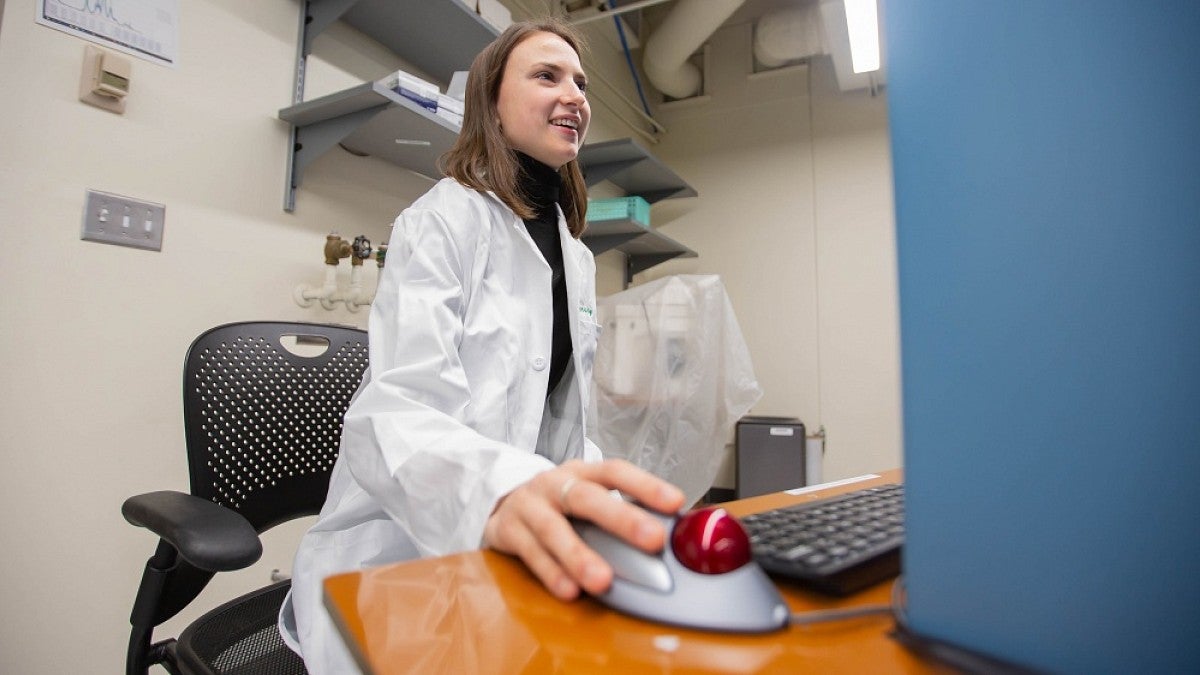Research matters, and scientists can do more to make their important work accessible to the public. Those are the messages UO biology major Rennie Kendrick takes to Congress this April.
The Stamps Scholar from Portland was chosen among 60 of the nation’s top undergraduate researchers to participate in Posters on the Hill, a Washington, D.C. event showcasing innovative student work and demonstrating the value of federal investments in undergraduate research.
“It’s exciting,” said the Clark Honors College senior. “It will be great for members of Congress to see what’s happening at the undergraduate level. It’s important to fund and encourage this research, because discoveries have been made by undergraduates — important discoveries.”
Sponsored by the Council on Undergraduate Research, the annual event highlights student research for members of Congress, congressional staffers and federal government officials. A national panel of experts in their respective fields selects the finalists, and Kendrick is the second UO student to attend since the university joined the council in 2014.
The Undergraduate Research Opportunity Program and Vice President for Research and Innovation are helping fund her trip.
Kendrick will be presenting a poster on memory and innovative thinking, the subject of her honors thesis. Her plans include meeting with members of Oregon’s congressional delegation. Assistant professor Dasa Zeithamova-Demircan is helping Kendrick with the project, part of their work in the UO’s Brain and Memory Lab.
The research is novel and complex. But Kendrick is planning a straightforward presentation.
“There seems to be a growing misunderstanding about science — for the general public, as well as the politicians who make decisions and allocate resources,” she said. “As scientists, we need to be able to communicate.”
Kendrick’s fascination with science started early. After learning about birds in the third grade, she wanted to be an ornithologist. For Christmas, she’d ask for research-related gifts, such as her treasured weather measurement kit.
Kendrick first learned about neuroscience while preparing for the eighth-grade science fair. She started her project on memory the summer before school had even started, submitting her idea to the Institutional Review Board so she could conduct experiments with people.
“When you’re an eighth-grader, you can’t do much with human subjects,” she recalled. “But I got my approval. And I checked out every neuroscience book they had at the library. I just could not get enough of it. I knew about psychology and biology, then they fused together in my mind. I realized there was an entire biology to how we memorize things and have memories. That blew my mind. From then on, I have wanted to be a neuroscientist.”
Kendrick excelled at Portland’s Grant High School, where she ran track and cross country, participated in the state championship cross country team, was part of the 2016 state girl’s 6A champion 4x400 meter relay squad and qualified for state in the 1,500- and 3,000-meter events. She also served as managing editor of Grant Magazine, participated in Grant’s award-winning Constitution Team — which has competed in the We the People national finals — sang in the Royal Blues chamber choir, and volunteered in a behavioral neuroscience lab at Oregon Health and Science University-Portland Veterans Affairs Medical Center, where she was a 2017 Portland Veterans Affairs research fellow.
She chose the UO because she was offered a Stamps Scholarship, the university’s most prestigious and generous scholarship. Granted by the UO and the Strive Foundation, it is awarded to just 10 incoming freshmen each year, five residents and five nonresidents.
Kendrick joined the UO’s track and cross-country teams as a walk-on during her first year and continued until injuries — ongoing stress fractures that sporadically kept her from competing — forced her to step down this year.
“Those were tough lessons,” she said. “You put so much time into something and tomorrow you could be on crutches. That’s a good analogy for research, because you can put years into a project and find that it’s a null result. You have to be OK with saddling up again and putting effort into something, even if you know it could all go wrong at the drop of a hat. It’s a nonlinear progression sometimes, but you have to keep in mind you are still making progress.”
Over the years, Kendrick has been able to participate in research opportunities and make the most of her undergraduate experience thanks to support from UO organizations such as the Undergraduate Research Opportunity Program, the Office of the Vice President for Research and Innovation, the Center for Undergraduate Research and Engagement and the Office of Distinguished Scholarships.
Kendrick and another student are collaborating with professor Alice Barkan on a genetics research project and Kendrick was a 2019 Peter O’Day Research Fellow. She currently works in the UO’s Brain and Memory Lab, as well as the McCormick Lab at the Institute of Neuroscience. She also teaches a supplemental instruction course for business calculus and tutors students in biology, math and chemistry.
After graduating this spring, Kendrick heads to the University of British Columbia, where she’ll be working in a lab studying mechanisms of fear memory formation. She hopes to someday join the faculty at a college or university, combining her top three interests: research, teaching and writing.
—By Ed Dorsch, University Communications


